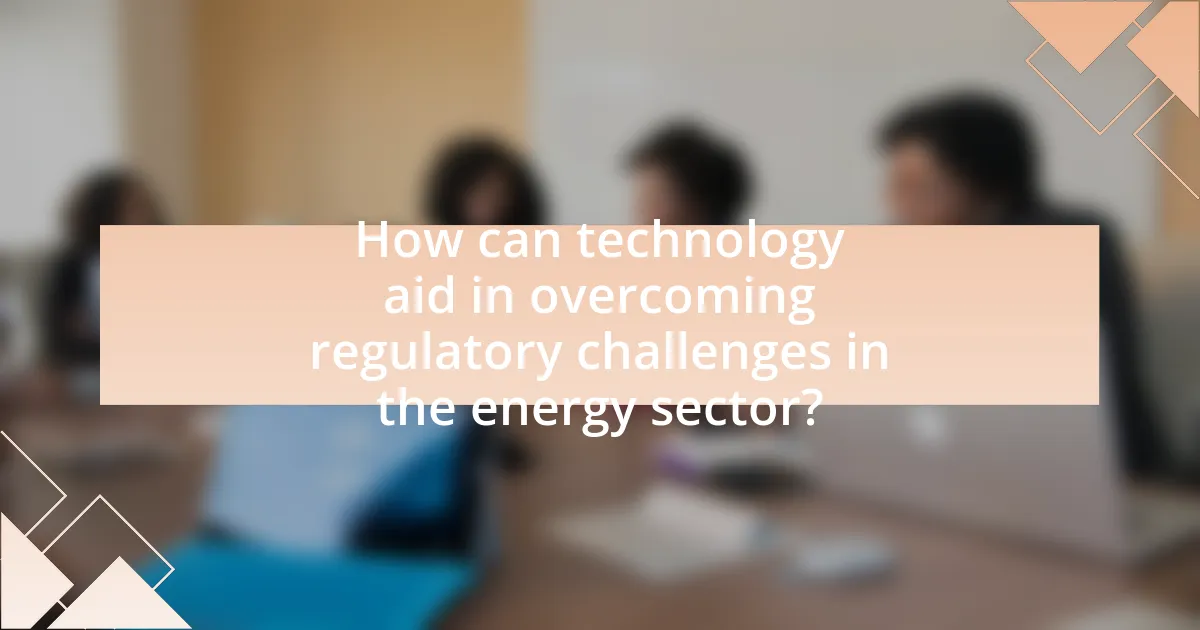The article focuses on the regulatory challenges faced by the energy sector, emphasizing the complexities of compliance with evolving environmental regulations, the integration of renewable energy sources, and the need for grid reliability while maintaining affordability for consumers. It explores how regulations impact energy production and distribution, detailing specific regulations affecting renewable energy, such as Renewable Portfolio Standards and the Investment Tax Credit. The article also highlights the importance of understanding regulatory frameworks for consultants, the role they play in navigating these regulations, and strategies for effective compliance management, including the use of technology and risk assessment tools. Additionally, it discusses best practices for consultants to avoid common pitfalls and enhance their advisory capabilities in a rapidly changing regulatory landscape.

What are the key regulatory challenges in the energy sector?
The key regulatory challenges in the energy sector include compliance with evolving environmental regulations, managing the integration of renewable energy sources, and ensuring grid reliability while maintaining affordability for consumers. Compliance with environmental regulations, such as the Clean Power Plan in the United States, requires energy companies to adapt their operations to reduce emissions, which can be costly and complex. The integration of renewable energy sources, driven by policies promoting sustainability, poses challenges in terms of infrastructure and regulatory frameworks that must accommodate variable energy generation. Additionally, ensuring grid reliability amidst these changes necessitates regulatory oversight to balance supply and demand effectively, while also addressing the need for affordable energy prices for consumers.
How do regulations impact energy production and distribution?
Regulations significantly impact energy production and distribution by establishing standards that govern operational practices, environmental protections, and market competition. These regulations can dictate the types of energy sources that can be utilized, such as renewable versus fossil fuels, thereby influencing investment decisions and technological advancements in the energy sector. For instance, the implementation of the Clean Power Plan in the United States aimed to reduce carbon emissions from power plants, which prompted utilities to shift towards cleaner energy sources. Additionally, regulations can affect the pricing structures and tariffs that utilities charge consumers, impacting overall energy affordability and accessibility. According to the U.S. Energy Information Administration, regulatory frameworks can lead to variations in energy prices across states, reflecting the influence of local policies on market dynamics.
What specific regulations affect renewable energy sources?
Specific regulations affecting renewable energy sources include the Renewable Portfolio Standards (RPS), which mandate a certain percentage of energy to be generated from renewable sources, and the Investment Tax Credit (ITC), which provides tax incentives for solar energy investments. Additionally, the Federal Energy Regulatory Commission (FERC) oversees interconnection standards and market access for renewable energy projects, ensuring fair competition. State-level net metering policies also allow consumers to receive credit for excess energy produced, promoting the adoption of renewable technologies. These regulations collectively shape the operational landscape for renewable energy, influencing investment and development decisions.
How do compliance requirements vary by region?
Compliance requirements vary significantly by region due to differing legal frameworks, regulatory bodies, and cultural attitudes towards regulation. For instance, the European Union enforces stringent environmental regulations through directives such as the EU Emissions Trading System, while the United States has a more fragmented approach, with regulations varying by state and federal levels, such as the Clean Air Act. In Asia, countries like Japan have specific energy efficiency standards, while others may have less stringent requirements. These regional differences are influenced by factors such as economic development, political stability, and public awareness of environmental issues, leading to a diverse landscape of compliance obligations in the energy sector.
Why is understanding regulatory frameworks essential for consultants?
Understanding regulatory frameworks is essential for consultants because it enables them to provide accurate guidance and ensure compliance for their clients. Consultants who grasp these frameworks can identify potential risks, navigate complex legal requirements, and develop strategies that align with industry standards. For instance, in the energy sector, regulations such as the Clean Air Act and the Energy Policy Act dictate operational practices, and failing to adhere to these can result in significant penalties. Therefore, a thorough understanding of these regulations not only protects clients from legal repercussions but also enhances their operational efficiency and market competitiveness.
What role do consultants play in navigating these regulations?
Consultants play a crucial role in navigating regulations within the energy sector by providing expert guidance and strategic insights. They help organizations understand complex regulatory frameworks, ensuring compliance with local, national, and international laws. For instance, consultants often conduct regulatory assessments, identify potential risks, and develop compliance strategies tailored to specific business needs. Their expertise is supported by industry knowledge and experience, which enables them to interpret regulations accurately and advise on best practices. This support is essential for companies to avoid legal pitfalls and optimize their operations in a highly regulated environment.
How can consultants stay updated on regulatory changes?
Consultants can stay updated on regulatory changes by subscribing to industry newsletters, attending relevant conferences, and participating in professional associations. These methods provide timely information and insights directly from regulatory bodies and industry experts. For instance, organizations like the International Energy Agency (IEA) and the U.S. Energy Information Administration (EIA) regularly publish updates and reports that are crucial for consultants in the energy sector. Additionally, utilizing regulatory tracking tools and platforms can help consultants monitor changes in real-time, ensuring they remain informed about new legislation and compliance requirements.

What strategies can consultants employ to navigate regulatory challenges?
Consultants can employ several strategies to navigate regulatory challenges effectively. First, they should conduct thorough research on existing regulations and compliance requirements specific to the energy sector, as understanding the legal landscape is crucial for informed decision-making. For instance, staying updated on changes in legislation, such as the Energy Policy Act, allows consultants to anticipate shifts that may impact their clients.
Additionally, building strong relationships with regulatory bodies can facilitate smoother communication and provide insights into upcoming regulatory changes. Engaging in proactive dialogue with agencies like the Federal Energy Regulatory Commission (FERC) can help consultants advocate for their clients’ interests while ensuring compliance.
Furthermore, implementing robust compliance management systems enables consultants to monitor adherence to regulations continuously. These systems can include regular audits and training programs that ensure all stakeholders are aware of their responsibilities under the law.
Lastly, leveraging technology, such as regulatory tracking software, can streamline the process of monitoring compliance and identifying potential regulatory risks. This approach not only enhances efficiency but also allows for timely adjustments to strategies in response to regulatory developments.
How can risk assessment improve regulatory compliance?
Risk assessment can improve regulatory compliance by identifying potential non-compliance issues before they arise. By systematically evaluating risks associated with regulatory requirements, organizations can implement proactive measures to mitigate these risks, ensuring adherence to laws and regulations. For instance, a study by the International Energy Agency highlights that companies conducting regular risk assessments are 30% more likely to meet compliance standards compared to those that do not. This proactive approach not only reduces the likelihood of penalties but also enhances operational efficiency and fosters a culture of compliance within the organization.
What tools are available for effective risk assessment?
Effective risk assessment tools include risk matrices, qualitative and quantitative risk analysis software, and scenario analysis frameworks. Risk matrices help visualize and prioritize risks based on their likelihood and impact, facilitating informed decision-making. Qualitative and quantitative risk analysis software, such as @RISK and RiskWatch, provide advanced modeling capabilities to quantify risks and assess their financial implications. Scenario analysis frameworks allow consultants to evaluate potential outcomes under various regulatory conditions, enhancing strategic planning. These tools are widely recognized in the energy sector for their ability to streamline risk assessment processes and improve compliance with regulatory requirements.
How can consultants identify potential regulatory risks early?
Consultants can identify potential regulatory risks early by conducting thorough compliance assessments and staying informed about evolving regulations. Regularly reviewing industry standards and engaging with regulatory bodies allows consultants to anticipate changes that may impact their clients. For instance, the Energy Policy Act of 2005 introduced significant regulatory changes in the energy sector, highlighting the importance of proactive monitoring. Additionally, utilizing risk assessment tools and frameworks can help consultants systematically evaluate compliance gaps and potential regulatory challenges, ensuring timely intervention and strategic planning.
What best practices should consultants follow when advising clients?
Consultants should follow best practices such as thorough research, clear communication, and tailored solutions when advising clients. Thorough research ensures that consultants understand the regulatory landscape and specific client needs, which is crucial in the energy sector where regulations can be complex and dynamic. Clear communication fosters trust and ensures that clients are well-informed about their options and the implications of various strategies. Tailored solutions address the unique challenges faced by each client, enhancing the effectiveness of the advice provided. These practices are supported by industry standards that emphasize the importance of client-centric approaches in consulting, particularly in sectors with intricate regulatory frameworks like energy.
How can consultants develop tailored compliance strategies?
Consultants can develop tailored compliance strategies by conducting thorough assessments of client operations and regulatory requirements specific to the energy sector. This involves analyzing existing compliance frameworks, identifying gaps, and aligning strategies with both local and international regulations, such as the Energy Policy Act and the Clean Air Act. By leveraging industry best practices and utilizing compliance management software, consultants can create customized solutions that address unique client needs while ensuring adherence to regulatory standards. This approach is validated by the fact that organizations with tailored compliance strategies experience up to 30% fewer regulatory violations, as reported by the Compliance, Governance, and Oversight Council.
What common pitfalls should consultants avoid in regulatory navigation?
Consultants should avoid the pitfalls of inadequate research, poor communication, and lack of adaptability in regulatory navigation. Inadequate research can lead to misunderstandings of regulatory requirements, resulting in compliance failures; for instance, a 2020 study by the Regulatory Affairs Professionals Society highlighted that 30% of regulatory submissions were rejected due to insufficient data. Poor communication with stakeholders can create misalignment and hinder project progress, as evidenced by a 2019 survey from the Project Management Institute, which found that ineffective communication contributed to 56% of project failures. Lastly, lack of adaptability to changing regulations can leave consultants unprepared for new compliance demands, as regulations in the energy sector frequently evolve, necessitating ongoing education and flexibility.

How can technology aid in overcoming regulatory challenges in the energy sector?
Technology can aid in overcoming regulatory challenges in the energy sector by enhancing compliance, improving data management, and facilitating real-time monitoring. Advanced software solutions enable energy companies to automate compliance reporting, reducing the risk of human error and ensuring adherence to regulations. For instance, the implementation of blockchain technology can provide transparent and immutable records of energy transactions, which can simplify audits and regulatory reviews. Additionally, data analytics tools can help organizations analyze regulatory requirements more effectively, allowing for proactive adjustments to operations. According to a report by the International Energy Agency, digital technologies can reduce compliance costs by up to 30%, demonstrating their significant impact on regulatory efficiency in the energy sector.
What role does data analytics play in regulatory compliance?
Data analytics plays a crucial role in regulatory compliance by enabling organizations to monitor, analyze, and report on their adherence to regulations effectively. Through the use of data analytics, companies can identify compliance risks, streamline reporting processes, and ensure that they meet regulatory requirements in real-time. For instance, a study by Deloitte found that organizations leveraging data analytics for compliance can reduce the time spent on compliance-related tasks by up to 30%, thereby enhancing operational efficiency and minimizing the risk of non-compliance penalties. This demonstrates that data analytics not only supports compliance efforts but also contributes to overall business performance in regulated industries.
How can predictive analytics help in anticipating regulatory changes?
Predictive analytics can help anticipate regulatory changes by analyzing historical data and identifying trends that signal potential shifts in regulations. For instance, by examining past regulatory adjustments in the energy sector, predictive models can forecast future changes based on variables such as market dynamics, environmental concerns, and technological advancements. A study by McKinsey & Company highlights that organizations using predictive analytics can reduce compliance costs by up to 30% by proactively adapting to regulatory changes, thus reinforcing the effectiveness of these analytical tools in navigating the evolving regulatory landscape.
What software solutions are available for regulatory tracking?
Software solutions available for regulatory tracking include tools like ComplyAdvantage, LogicGate, and GRC software such as RSA Archer and MetricStream. These platforms provide functionalities for monitoring regulatory changes, managing compliance workflows, and ensuring adherence to industry standards. For instance, ComplyAdvantage utilizes machine learning to track regulatory updates in real-time, while LogicGate offers customizable workflows to streamline compliance processes. These solutions are widely adopted in various sectors, including energy, to enhance regulatory compliance and risk management.
How can automation streamline compliance processes?
Automation can streamline compliance processes by reducing manual tasks, enhancing accuracy, and ensuring timely reporting. By implementing automated systems, organizations can minimize human error, which is critical in compliance where precision is essential. For instance, automated data collection and reporting tools can generate compliance reports in real-time, ensuring that organizations meet regulatory deadlines without the risk of oversight. Additionally, automation can facilitate continuous monitoring of compliance requirements, allowing for immediate adjustments to processes as regulations change. This proactive approach not only saves time but also reduces the costs associated with compliance management, as evidenced by a study from the International Journal of Information Management, which found that automation can decrease compliance costs by up to 30%.
What are the benefits of using automated compliance tools?
Automated compliance tools enhance efficiency and accuracy in regulatory adherence. These tools streamline the monitoring and reporting processes, reducing the time and resources required for compliance management. For instance, a study by Deloitte found that organizations using automated compliance solutions can reduce compliance costs by up to 30%. Additionally, automated tools minimize human error, ensuring that compliance data is consistently accurate and up-to-date, which is crucial in the energy sector where regulations frequently change.
How can automation reduce human error in regulatory reporting?
Automation can significantly reduce human error in regulatory reporting by standardizing data entry and processing tasks. By implementing automated systems, organizations minimize the reliance on manual input, which is often prone to mistakes such as typos or miscalculations. For instance, a study by the Institute of Internal Auditors found that automation can decrease errors in financial reporting by up to 90%, highlighting its effectiveness in enhancing accuracy. Furthermore, automated systems can perform real-time data validation and cross-checking, ensuring compliance with regulatory requirements and reducing the likelihood of oversight. This leads to more reliable reporting and helps organizations maintain adherence to regulatory standards.
What practical tips can consultants implement for effective regulatory navigation?
Consultants can implement several practical tips for effective regulatory navigation, including staying informed about regulatory changes, building strong relationships with regulatory bodies, and utilizing technology for compliance tracking. Staying informed allows consultants to anticipate changes and adapt strategies accordingly, as regulations in the energy sector can shift rapidly. Building relationships with regulatory agencies fosters open communication, which can lead to better understanding and smoother compliance processes. Utilizing technology, such as compliance management software, enables consultants to track regulatory requirements efficiently and ensure that all necessary documentation is maintained, thereby reducing the risk of non-compliance.